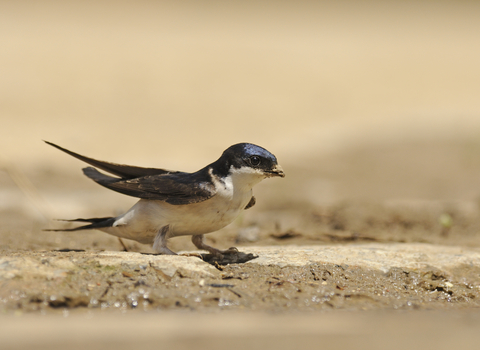
©Dawn Monrose
House martin
As its name suggests, the house martin can be spotted nesting in the eaves of houses in our towns and villages. Its intricate mud nests take days to build and are often returned to and used in following years.
Scientific name
Delichon urbicumWhen to see
April to OctoberSpecies information
Statistics
Length: 13cmWingspan: 28cm
Weight: 19g
Average lifespan: 2 years
Classified in the UK as Red under the Birds of Conservation Concern 5: the Red List for Birds (2021).
About
The house martin is a common summer visitor to the UK, arriving in April and leaving in October. It builds mud nests, sometimes in small colonies, under ledges, on cliffs and, as their name suggests, under the eaves of houses. Both males and females help to build the nest, collecting mud from streams and ponds and building up layers with bill-sized pellets. House martins are commonly found in towns and villages, as well as in agricultural areas. They feed on flying insects and aphids.How to identify
The house martin is glossy black above, completely white below, and has a white rump and a short, forked tail.Distribution
Widespread.Did you know?
House martins will return from their African wintering grounds to the same nesting sites each year. They can reuse their old nests, saving them about ten days' work collecting mud. So don't knock down that empty nest - you never know who might turn up to use it!Watch
House martin (https://vimeo.com/642774948)
Russell Savory
